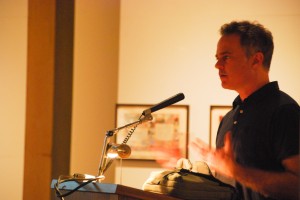On Wednesday, Harrell Fletcher, a Portland-based artist gave a talk in Faulconer Gallery about the projects he has worked on. Fletcher engages in art as a form of social practice, i.e. he collaborates extensively with his subjects, allowing them to make active decisions regarding the projects they feature in.

“We are trying to form a reciprocal relationship between the audience and the artist, giving them the opportunity to step in the world of the artist,” Fletcher said.
When in graduate school, Fletcher set up his first show in collaboration with artist Jon Rubin. Both Fletcher and Rubin were interested in making their exhibits appealing to a wide range of people, including those who did not frequent galleries and art shows. To achieve this objective, they chose subjects from the community that they were in and a space on a busy commercial street that people would stumble upon.
Another project that Fletcher undertook involved photographing the employees of a Civic Center and then offering free art classes to anyone who was interested with the stipulation that they would draw portraits of the employees.
“There was an art center and we asked the people around it about it and they said that they didn’t go inside because it was inaccessible and they didn’t understand the exhibits,” he said, describing the motivation behind this particular project.
Fletcher has also put together bigger scale exhibits, most notably for the San Francisco Museum of Modern Art (SFMoMA). The SFMoMA exhibit, titled “Wallet Pictures,” documented the wallet pictures of visitors to the museum on a certain day.
“Back in the old days when people did this you would have to be very selective about the pictures you kept in your wallet. We were trying to say that this was equivalent to the art work that was showed in the museum,” he said.
Fletcher also spent time in France working with an eight-year old boy named Corentine in order to create a statue for a statue park that had been thought up by a local. Three summers later, the two of them unveiled a bronze and gold turtle that had been painted green.
“[Painting it] was a very crucial part in some ways– negating what we value about gold by covering it in everyday paint,” Fletcher said.
Fletcher has been involved in various other projects ranging from displaying families’ garage sale items, to chronicling the Vietnam War from a Vietnamese perspective, to discovering the Portland-based political street artist Michael Patterson-Carver who went on to eventually land shows in London and New York.


















































